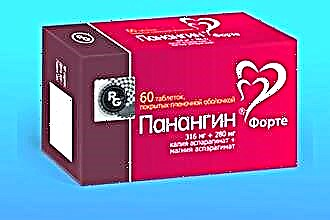An allergic rhinitis can bring any person to exhaustion. Profuse nasal discharge, facial swelling, watery eyes and sneezing negatively affect not only mood, but also well-being. The disease manifests itself suddenly and therefore antiallergic drugs are not always at hand at the right time. Is it possible to treat allergic rhinitis with folk remedies?
 Alternative medicine can reduce the severity of allergic reactions. In the case of proper preparation of medicinal decoctions and nasal drops, it is possible to stop the symptoms of a cold and hay fever within 3-4 days. But it should be borne in mind that some types of herbs and foodstuffs themselves may contain irritating substances. Therefore, before using them, you should still consult with an allergist. Otherwise, the development of a cross-allergic reaction is possible, which will only aggravate the state of health.
Alternative medicine can reduce the severity of allergic reactions. In the case of proper preparation of medicinal decoctions and nasal drops, it is possible to stop the symptoms of a cold and hay fever within 3-4 days. But it should be borne in mind that some types of herbs and foodstuffs themselves may contain irritating substances. Therefore, before using them, you should still consult with an allergist. Otherwise, the development of a cross-allergic reaction is possible, which will only aggravate the state of health.
Traditional medicine and allergies
It should be understood that folk remedies will be effective in treating mild forms of hay fever (allergic rhinitis). Their use can reduce inflammation in the nasopharynx, mucosal edema and hypersecretion of nasal mucus. However, doctors recommend using folk remedies only when taking traditional antihistamines in parallel. The question arises: why use them at all, if you can get by with pharmaceutical preparations?
The fact is that natural herbal remedies do not contain preservatives, dyes and synthetic substances that can increase the degree of sensitization (hypersensitivity) of the body. Moreover, certain herbs contain anti-inflammatory components and antioxidants that help remove toxic substances from the body. All this only speeds up the healing process and prevents recurrence of allergic reactions.
Herbal preparations suppress pathological reactions in tissues and prevent histamine from entering the systemic circulation. It is this substance that is the main catalyst for inflammatory processes in the respiratory organs. In addition, alternative medicine, in particular adaptogens (sea buckthorn, lemongrass, ginseng), stimulate the immune system and prevent the development of infection in the nasopharynx.
General recommendations
Treatment of allergic rhinitis with folk remedies can be carried out only after the elimination of the allergen that provoked the development of hay fever. The most common provocateurs of inflammation are: plant pollen, dust mites, exhaust gases, molecules of household chemicals, tobacco smoke, animal hair, etc.
The progression of allergic rhinitis and hay fever is fraught with the spread of inflammation to the mucous membrane of the bronchi, larynx, trachea and paranasal sinuses.
To increase the effectiveness of alternative therapy, during an exacerbation of the disease, it is recommended:
- regularly do wet cleaning indoors;
- change bedding at least 3 times a week;
- as much as possible to reduce the time spent on the street;
- take a shower at least 2 times a day;
- use humidifiers;
- exclude foods with a high degree of allergenicity.
Typically, traditional treatments involve the use of corticosteroids and antihistamines. Some of them put stress on the liver and are therefore not recommended for people with liver failure. At the same time, traditional medicine is able to offer a lot of recipes for the preparation of antiallergic drugs that are suitable for the treatment of patients with renal and hepatic insufficiency, hypertension, stomach ulcers, etc.

Antihistamine diet
It is advisable to start treatment of allergic rhinitis by correcting your own diet. Allergists recommend for a while to exclude from the menu all products that contain a large amount of histamine. To quickly get rid of allergies, it is advisable to stop using the following products for at least a couple of weeks:
- hard cheeses;
- smoked meat;
- red fish;
- chickpeas;
- honey;
- berries;
- seafood;
- legumes;
- sausages;
- bakery products.
By following an antihistamine diet, you can shorten the recovery period by at least 3-4 days. Moreover, a special nutritional strategy allows you to reduce the concentration of toxic substances in the body that stimulate disorders in the functioning of the immune system. Thus, it is possible not only to speed up the recovery, but also to delay the relapse of allergies.
What foods can you eat with a hypoallergenic diet? Foods with a low degree of allergenicity include:
- chicken breast;
- boiled beef;
- homemade cottage cheese;
- cornbread;
- green apples;
- squash;
- sunflower oil;
- zucchini;
- rice porrige;
- white cherry.
In order to draw up a suitable dietary program, it is advisable to seek the help of an allergist or dietitian.
Rinsing the nose
Sanitation of the nasopharynx with saline solutions allows you to quickly get rid of allergic rhinitis.
Regular moisturizing and disinfection of the mucous membrane prevents irritation and severe tissue swelling. In addition, isotonic and hypertonic solutions improve vascular tone and accelerate mucosal regeneration. In this regard, the amount of secreted nasal mucus decreases and, accordingly, the severity of the common cold.
To prepare a suitable nasal irrigation solution:
- dissolve in 500 ml of boiled water ½ tsp. table or sea salt;
- mix the components thoroughly until the precipitate is completely dissolved;
- heat the solution to a comfortable temperature (no more than 37 ° C).
To increase the effectiveness of the procedure, it is better to inject salt water into the nasal cavity using a syringe with a rubber tip.
Of course, it will not be possible to cure an allergic rhinitis with the help of rinsing, but for sure to improve health and remove swelling from the nasopharyngeal mucosa. If you have no desire to mess around with the preparation of the solution, you can take a ready-made 0.9% sodium chloride solution at the pharmacy. They can not only rinse the nasal passages, but also gargle if necessary.
Herbal decoctions
How to treat allergic rhinitis with folk remedies? A properly prepared herbal tea is the best remedy for hay fever.
Many adherents of traditional medicine advise using honey and aloe juice to treat the disease, but it is these products that have a high degree of allergenicity. Therefore, not every allergy sufferer can use them.
However, there are safer and more versatile remedies that can ease the course of allergies.
To prepare a universal anti-allergic broth, you will need:
- 2 tbsp. horsetail;
- 4 tbsp. St. John's wort;
- 3 tsp corn stigmas;
- 3 tbsp. rose hips;
- 2 tbsp. centaury;
- 3 tsp dandelion roots.
Important! You can cook the broth only in an enamel bowl and filter it with gauze folded in at least 4 layers.
The above herbs must be thoroughly chopped and filled with 400 ml of warm water. You need to boil the product for at least 5 minutes over low heat, and then insist for another 7-10 hours. The filtered broth should be taken 100 ml three times a day until the main symptoms of allergy disappear.
What cannot be done?
There is a whole set of traditional mistakes that are made during the "folk" treatment of allergic rhinitis.Sometimes inadequate therapy significantly complicates the course of the disease and even leads to complications. To avoid unpleasant consequences, you need to know exactly what cannot be done during treatment:
- use warming compresses and a heating pad;
- make steam inhalations using honey, nettle and aloe;
- use herbs and infusions without first consulting a herbalist or allergist;
- lubricate the nasal passages with concentrated juices of vegetables and medicinal herbs;
- instill in the nose a decoction of onion peel and garlic.
The aforementioned remedies are not just useless - they can provoke the development of cross-allergic reactions.
If you are not sure about the safety of certain antiallergic drugs, it is better to play it safe once again and consult a doctor.



